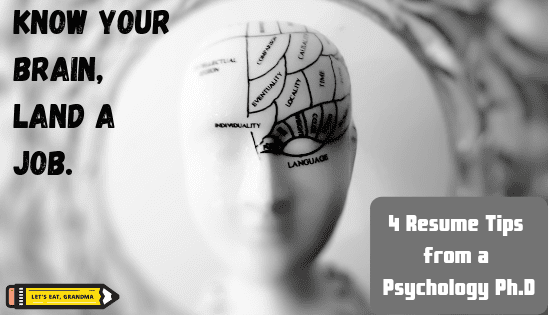Intimidated by your job search? Read up on these job search psychology insights from a Ph.D.’s new book. You’ll be surprised at how the workings of your brain can help you land an interview!
By: Jeff Beckham | Freelance Writer and Advisor for Let’s Eat, Grandma
As a psychology professor, Art Markman has a pretty solid go-to line. “Pretty much everybody has a mind,” he likes to say, “But unfortunately, nobody knows how it works.”
In his new book, Bring Your Brain to Work: Using Cognitive Science to Get a Job, Do it Well, and Advance Your Career, Markman admits that college often doesn’t do a very good job of preparing us for the workplace.
Psychology, however, can teach us some useful things about office life. And the first of those is how understanding ourselves and others can give us an advantage when we’re job-hunting.
A Job Search Psychology Primer: Put Yourself in the Recruiter’s Position

When you’re applying for a position, Markman suggests a little role-playing exercise.
Imagine what it’s like on the other end of the application process. The recruiter receiving your resume is going to get dozens – or hundreds – of resumes for one opening. That means their first goal is to get that down to a manageable number.
Scientists call this approach task compatibility. Studies have found that people give the most weight to information that is most compatible with the task they are performing at that moment, regardless of their goal.
So even though a recruiter does eventually want to find the best person for the job, their first task is to reject as many applications as possible.
With that in mind, it’s your job to avoid giving the recruiter any obvious reasons to throw your resume out. That includes the basics like proofreading your resume and cover letter carefully. Double-check the name of the company and the person you’re sending it to. You might even take a second look at how you formatted your resume. If it’s hard to read, that will be reason enough to toss it out.
Use Their Language
There are a couple of other job search psychology tips to ensure your resume makes the cut. Markman says the advice he hears most from recruiters is to be familiar with the mission of the organization and clear about what the job ad said. A little research goes a long way.
You can also take advantage of a psychological factor called processing fluency. It shows that the easier someone can think about something, the better they like it.

To increase the recruiter’s processing fluency, Markman says, use the same language they use in the job description. Don’t just write a recap in your own words, but actually repeat the words the organization uses to describe itself.
In the book, Markman talks about this job search psychology nugget with a recruiter who also has applied for several jobs himself:
“In resumes and interviews I use the same language [the employer] uses,” the recruiter says. “The same thing can be conveyed in so many different ways. If you describe what they want but in your own words, you run a greater risk that they won’t realize you’re exactly what they’re looking for.”
Avoid The Presenter’s Paradox
An interesting shift happens when recruiters finish weeding through the initial pile of resumes. Once they’ve identified the few they want to look at in more detail, their approach shifts from rejection to acceptance. Rather than look for reasons to reject your application, now they’re looking for reasons to bring you in for an interview.
To give yourself the best chance of getting that call, Markman advises being careful of the presenter’s paradox. We tend to think that throwing in every positive thing about ourselves we can think of is the best approach. After all, the more good things the better, right?
Not so fast, Markman says. The presenter’s paradox keeps us from seeing that more is not always better when it comes to a resume.
“The assumption is that recruiters are going through this additive process -that they’re giving you points for all the positive things you come up with,” Markman says. “But while people evaluate a resume, what they’re actually doing is averaging. So, to a recruiter, four things that are great are better than four things that are great plus one thing that’s ‘eh.’”
Make sure the content on your resume is tailored and targeted, rather than just a collection of every good thing about you..
A Reason-Based Choice

Finally, your goal with your resume, of course, is landing that interview. Markman recommends keeping in mind a long-studied aspect of psychology called reason-based choice to play the long game and get your application to the interview stage.
Reason-based-choice means that when people will have to justify the choices they make, they’ll look for a reason for those choices. A recruiter will likely have to justify to the company why they decided to bring you in for an interview or recommend you for a job, and they’ll need to give a specific reason.
If your resume and cover letter are accurate, highlight your accomplishments, and have metric-bound evidence to back up what you say, you’re handing a recruiter the reasons they’ll need to supply for choosing you.
Think About It
It’s not enough to just have a degree and expect to land a job anymore. In today’s competitive job environment, psychology might give you the edge you need. Knowing a few things about how and why we make decisions will help you make sure your application materials get you through to an interview.
For even more resume help, sign up now for a FREE phone consultation with one of Let’s Eat, Grandma’s business writing experts to ensure your resume and cover letter will make a recruiter smile.
(And for more fun, verified career tips from industry experts, check out our Career Warrior Podcast on Spotify, Apple, or wherever else you get your podcasts!)

About the Author

Jeff’s writing spans internal communications, content marketing, and brand journalism, as well as freelance stories for Wired, Texas Monthly, Sports Illustrated, The New York Times, Slate, and Deadspin. He advises Let’s Eat, Grandma on content strategy and loves talking with fascinating innovators and telling the world about their work. A native Texan, he lives in Austin, where he continues his search for the world’s best breakfast taco. You can connect with Jeff on LinkedIn, Twitter, or his website.

